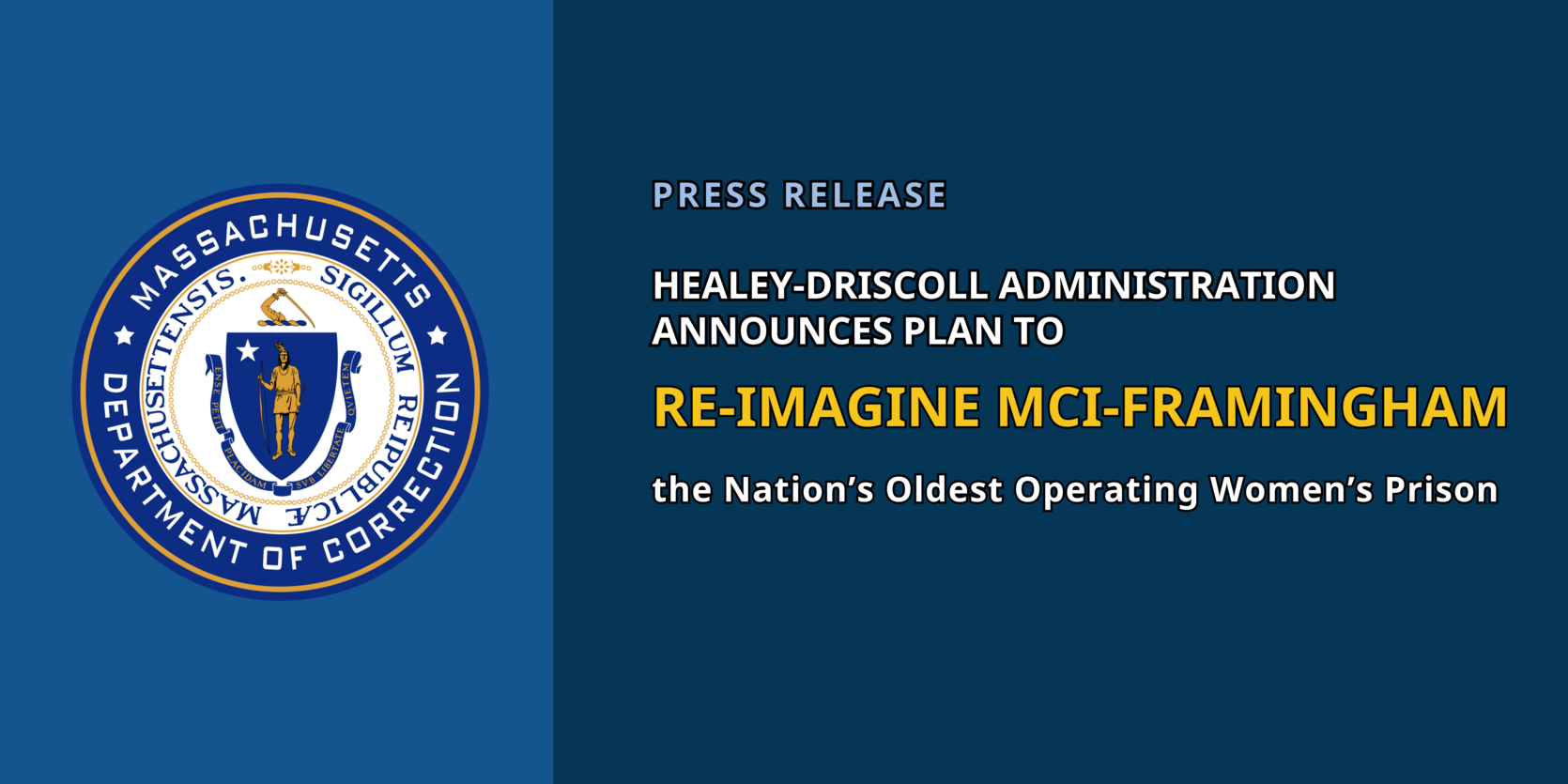- Massachusetts Department of Correction
- Executive Office of Public Safety and Security
Media Contact
Elaine Driscoll, Director of Communications and Policy

BOSTON — Today, the Healey-Driscoll Administration announced a capital investment plan to transform MCI-Framingham, originally built in 1877, into a modern and sustainable facility that supports rehabilitation and promotes public safety. The Fiscal Year 2026-2027 Capital Budget provides $20.5 million to support the Massachusetts Department of Correction (DOC) with the re-imagining of the state’s only women’s correctional facility into a rehabilitative environment that advances behavioral health, recovery, and successful reentry.
The phased redevelopment strategy will renovate, rehabilitate and responsibly downsize one of the country’s oldest operating prison campuses. With Massachusetts’ record low incarceration rate and the nation’s smallest population of incarcerated women, the strategic plan will include a significant reduction to the facility’s footprint from 260,000 to 200,000 square feet and a permanent decrease in bed capacity. This infrastructure plan aligns with the state’s decreasing prison population and reform-driven priorities.
“Massachusetts continues to lead the nation in recidivism reduction. That’s why we are seizing this opportunity to transform the country’s oldest operating women’s prison into a national model of rehabilitation and correctional innovation,” said Governor Maura Healey. “This is more than an investment in a 150-year-old building. It represents an investment in people, a commitment to second chances, and a responsibility to build a safer future for communities statewide.”
“The Department of Correction continues to advance nation-leading innovations that have resulted in historic low incarceration and recidivism rates,” said Lieutenant Governor Kim Driscoll. “Our investment in MCI-Framingham builds upon Massachusetts’ remarkable progress in providing a rehabilitative experience that not only meets the complex needs of the incarcerated population but supports the successful reintegration of individuals, which directly impacts the overall safety and security of our communities:”
With an anticipated total project investment of $360 million, this transformation will enhance the health and safety of all who live and work at the facility. It includes modernizing the housing unit, improving mental health treatment facilities, electrifying core infrastructure and, for the first time in the building’s history, introducing a temperature-controlled environment.
Focused on improvements to the existing MCI-Framingham campus and drawing on evidence-based strategies, the project will invest in vital renovations, including:
- Creating community-oriented living units sized to align with best practices within a campus-like setting.
- Developing a modern medical and mental health treatment facility to meet the complex behavioral health needs of the population and offer integrated, trauma-responsive care, as well as clinical workspace for caregivers.
- Providing residents with access to comprehensive health services, private counseling spaces, and crisis support in a setting that emphasizes privacy, dignity, and recovery.
- Enhancing program spaces to better support education, job training, recreation, religious services, and daily living needs such as dining and laundry
- Replacing aging systems with resilient, energy efficient technologies that support full electrification and eliminate reliance on steam, dramatically reducing the site’s carbon footprint
This plan follows an independent study commissioned by the Division of Capital Asset Management and Maintenance (DCAMM) to assess women’s incarceration in Massachusetts and how to best serve the needs of the population at MCI-Framingham. Developed by the Ripples Group, the 2022 report, A Strategic Plan for Women Who Are Incarcerated in Massachusetts, concluded that MCI-Framingham is “oversized, physically outdated for its rehabilitative mission, and requires significant capital investment.”
Furthermore, the report found that MCI-Framingham is unable to meet the needs of women not only due to the infrastructure’s physical condition but also a layout that is not conducive to a rehabilitative environment, even though the “DOC heroically manages to keep the campus’ facilities functioning.”
“This investment reflects our overarching goal of strategically aligning our infrastructure with our rehabilitative mission,” said Public Safety and Security Secretary Terrence Reidy. “We are grateful to Governor Healey and Lieutenant Governor Driscoll for their support of this vital effort and appreciate their shared commitment to improving outcomes for those in our care with the ultimate goal of promoting successful reintegration and community safety.”
“MCI-Framingham’s declining population requires a down-sized operational model to meet the DOC’s safety and security needs while prioritizing its primary mission of rehabilitation and reentry,” said DOC Commissioner Shawn Jenkins. “By investing in a correctional environment that can deliver on 21st century correctional values, we will continue to reduce recidivism and promote safer communities across Massachusetts.”
At the direction of Governor Healey, EOPSS and DCAMM have been tasked with completing this project as expeditiously as possible. In alignment with the administration’s directive, the agencies are working in close collaboration to ensure the renovation of MCI-Framingham is advanced efficiently and effectively.
HDR, the architectural firm contracted by DCAMM to create the renovation plan, has strategically developed a scalable design to allow for adjustments based on operational needs, emerging trends, and available resources.
| MCI-Framingham Facility Snapshot (as of May 2025) | |
|---|---|
| Category | Details |
| Facility Type | Medium Security + Diagnostic Center |
| Operational Capacity | 598 |
| Current Population | 218 |
| Population Breakdown | |
|---|---|
| Status | Count |
| Sentenced | 168 |
| Awaiting Trial | 26 |
| Dual Civil Commitments | 15 |
| Life Sentences | |
|---|---|
| Sentence Type | Count |
| Life Sentences (Total) | 53 |
| First Degree Murder | 25 |
| Second Degree Murder | 28 |
| Mental Health Overview | |
|---|---|
| Mental Health Status | Count |
| Open Mental Health Cases | 187 |
| With Serious Mental Illness (SMI) | 157 |
| On Psychotropic Medication | 134 |
Most of the population is in medium custody, and 42 percent of the criminally sentenced population are within five years of release, reinforcing the need for programming that supports rehabilitation and successful reentry.
To review Frequently Asked Questions about this project, click here.
###

